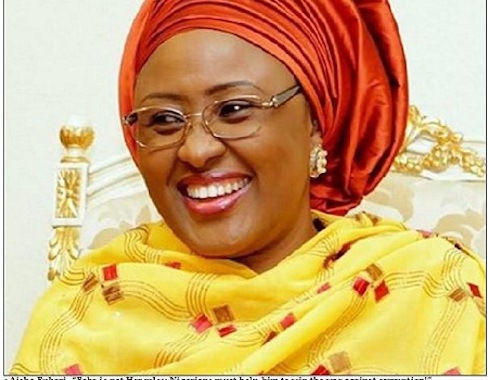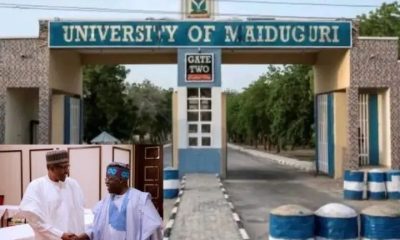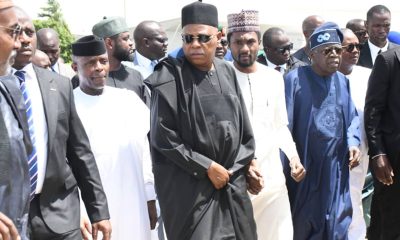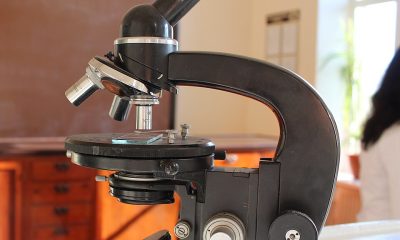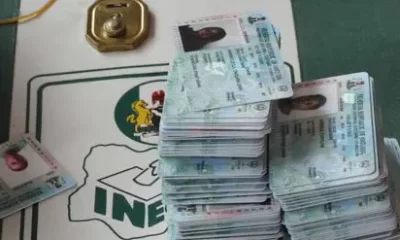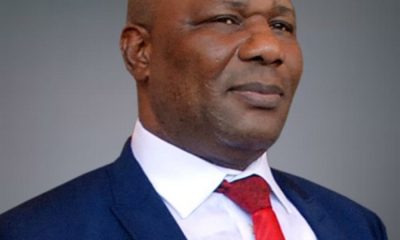Foreign News
Buhari Urges Gulf of Guinea Commission Countries to Pay Contributions

President Muhammmadu Buhari has appealed to member states of the Gulf of Guinea Commission (GGC) to remit their outstanding Annual Assessed Contributions to the Secretariat to meet the Commission’s objectives.
The President made the appeal at a virtual meeting of the Heads of State and Government of member states of the Commission, convened to review progress on efforts to deal with the maritime challenges in the region.
The News Agency of Nigeria (NAN) reports that the GGC is an international body that was established by the Treaty signed in Libreville, Gabon, on July 3, 2001, comprising Angola, Congo, Gabon, Equatorial Guinea, Nigeria, and Sao Tome and Principe.
Cameroon and the Democratic Republic of Congo joined the Gulf of Guinea Commission in 2008.
Membership of the Gulf of Guinea Commission is open to other states in the Gulf of Guinea region for the purpose of transforming the sub-region into a zone of peace and security.
According to the president, the continued non-payment by the majority has greatly affected the ability of the Commission to fulfill the mandate for which it was established in 2001.
He added that the inability of member-states to pay their assessment was threatening the continued existence of the Commission.
He also called for urgent collective action against the dangers and threats affecting maritime security in the Gulf of Guinea Region.
According to him, Nigeria considers the effective functioning of the GGC as strategic to the collective security interest in the Gulf region, particularly in addressing criminal issues.
He said such issues included piracy, the proliferation of Small Arms and Light Weapons, protection of marine resources, and irregular migration to the region.
“As a demonstration of our firm commitment towards the repositioning of the GGC into a more vibrant Organisation that will effectively deliver on its mandate, Nigeria hosted the 4th Ordinary Summit of the Assembly of Heads of States and Government of the Gulf of Guinea Commission (GGC) from Nov. 21 to Nov. 23, 2017, in Abuja.
“In addition, Nigeria hosted the 11th Ordinary session of the Council of Ministers of the Gulf of Guinea in Abuja from Nov. 19 to Nov. 20, 2019, as part of our efforts to revitalize the activities of the Commission.
“These sessions observed, inter alia, that non-payment of Assessed Contribution by a majority of the GGC member states to support the Commission’s operational budget has seriously affected the effective delivery of the organization’s mandate.
“Meanwhile, Nigeria has championed several efforts towards fighting maritime insecurity in the Gulf of Guinea,’’ the president said.
He highlighted that in June 2019, Nigeria’s National Assembly passed the Suppression of Piracy and Other Maritime Offences Act, 2019, (POMO Act) which aims to prevent and suppress piracy, armed robbery, and any other unlawful acts against a ship.
Furthermore, the president pledged that Nigeria would continue to deploy significant resources toward tackling piracy in the Gulf of Guinea.
“Through the Deep Blue Project in June 2021, the Government of Nigeria unveiled 195million dollar-worth of boats, vehicles, and aircraft to spearhead the country’s fight against piracy in the Gulf of Guinea.
“The operational mechanisms in the Gulf of Guinea Region as you know are similar to those in some other regional organisations.
“For instance, ECOWAS and ECCAS have adopted protocols on the security of their Maritime domains and also set up Regional Centers for Maritime Security respectfully.”
The Nigerian leader, therefore, stressed the need for the GGC to adopt a collaborative strategy to engage partners and donors in creating awareness of the objectives of the organisation.
This, he said, was with a view to synergizing for more effective results toward fighting maritime insecurity in the GGC region.
“As Your Excellencies are aware, another challenge that confronted the organisation in its fight against maritime insecurity in the region is the COVID-19 Global Pandemic and its attendant negative impact on the activities of the Gulf of Guinea Commission, in 2020 and early 2021.
“What we need now is to work more than ever towards the revitalization of the organisation by holding regular meetings and Summits of the Commission,” he maintained.
The president also expressed his profound gratitude to fellow Heads of State for the support from all Member States during his tenure as Chair of the Assembly of Heads of State and Government of the GGC.
“This Summit marks the end of my chairmanship and will also be my last Summit in the Gulf of Guinea as Head of State.
”As we decide on the next Chairmanship, I am confident that I am bequeathing a revitalized Commission.
“I, therefore, urge you to extend the same support and solidarity I enjoyed during my tenure to my successor to ensure continuity in our efforts and commitment to address the challenges of our organization,” he said.
The Nigerian leader congratulated Amb. Florentina Ukonga, the Executive Secretary of the GGC, and her team for their hard work and commitment not only towards the organisation of this Summit but to running the organisation effectively.
He acknowledged the great work done by the outgoing Executive Committee led by Ukonga in spite of the paucity of funds the Committee had been grappling with.
The president expressed hope that the virtual Summit would yield fruitful results that would move the organisation forward.
President Nana Akuffo-Ado of Ghana emerged as the new President at the end of the Summit.
NAN reports that GGC was established to create conditions of mutual confidence, peace, and security conducive to the harmonious development of member states; and to promote close consultation in the exploitation of the natural resources of the Gulf of Guinea.
This is with a view to ensuring the economic development of member states and the well-being of their peoples.
Since 2013, the organisation has been more focused on building regional maritime security architecture. (NAN)
Foreign News
Australian Researchers Launch Open-source, Affordable DNA Measurement Device

Australian researchers have created an affordable, open-source device to measure DNA levels using parts made with a standard 3D printer.
The Do-It-Yourself Nucleic Acid Fluorometer (DIYNAFLUOR) offers an affordable alternative to expensive commercial DNA fluorometers, often out of reach for many researchers.
This is according to a statement released on Wednesday by Australia’s University of Queensland (UQ), which led the research.
Fluorometers, vital for DNA sequencing, which itself is essential for disease detection, therapeutic innovation, and species identification, can now be easily built at home.
Thanks to the simple, accessible device developed by UQ’s Australian Institute for Bioengineering and Nanotechnology (AIBN), the statement said.
The device can be built in under a day for around 60 Australian dollars (about 39 dollars) using off-the-shelf electronics and 3D-printed parts.
It’s with free instructions online and no need for advanced skills or specialised tools, said the designer of the device, Will Anderson, at the AIBN.
Once built, the device quantifies DNA by using a light beam to produce a fluorescent response from the dyed DNA present in the sample.
It would then report the DNA concentration to a connected computer, Anderson said.
“This is crucial information that can tell you whether you can proceed with more expensive tests and sequencing,” he added.
Laboratory tests confirmed the device matches the accuracy and sensitivity of costly commercial models, offering an affordable, open-source solution for researchers in resource-limited, remote, or educational settings, said the study.
Foreign News
Trump Imposes 25% Tariff on Indian Goods, Criticizes Ties with Russia

U.S. President Donald Trump said he is imposing a 25 per cent tariff on goods from India starting on Friday.
Writing on his Truth Social platform, Trump sharply criticises New Delhi for its military and energy ties with Russia.
He described India as a “friend” but accused the country of maintaining unfair trade practices that disadvantage U.
S. businesses.India has “strenuous and obnoxious” trade barriers that keep its markets closed to companies, he wrote, adding that its tariffs are “far too high.
”Trump also took aim at India’s relationship with Russia, saying: “They have always bought a vast majority of their military equipment from Russia, and are Russia’s largest buyer of ENERGY, along with China.
In addition to the new tariff, Trump said India would face a financial “penalty” for its purchases from Russia, though he did not provide further details.
Foreign News
Zelensky Announces New Draft Law on Anti-corruption Bodies after Protests

Ukrainian President Volodymyr Zelensky said he has approved the text of a draft law guaranteeing the freedom of two anti-corruption bodies in Ukraine – days after nationwide protests broke out over changes curbing their independence.
Kyiv’s Western partners had also expressed serious concerns over the legislation.
On Thursday, Zelensky seemed to backtrack, saying the new bill was intended to safeguard the independence of Ukraine’s National Anti-Corruption Bureau (Nabu) and Specialised Anti-Corruption Prosecutor’s Office (Sap), and to protect them from Russian influence.
He said the text of the bill was “balanced”, but did not provide any details.
The law passed earlier this week brought Nabu and Sap under the control of the prosecutor general, who is appointed by the president.
At the time Zelensky justified his decision to curtail the bodies’ powers by citing Russian influence. The day before, Ukraine’s security services had carried out searches and arrests targeting alleged Russian spies at the agency.
The passing of the legislation instantly sparked the largest protests since the start of Russia’s full-scale invasion in February 2022 in several cities across Ukraine, with many worrying the law would severely undermine the Nabu and Sap’s authority and effectiveness.
Thousands of people gathered in streets and squares across Ukraine, holding placards calling for the legislation to be vetoed.
Several commentators accused Zelensky of democratic backsliding. Their concerns were further exacerbated when Ukraine’s Western partners signalled their displeasure with the bill.
Ukraine has official EU candidate status and a spokesman for European Commission chief Ursula von der Leyen previously warned Kyiv that the rule of law and the fight against corruption were “core elements” of membership to the bloc.
On Thursday, the Commission said it “welcomed” the Ukrainian government’s decision to take action against the bill.
“We are working [with the Ukrainian government] to make sure that our concerns… are indeed taken into account,” the spokesman said.
Nabu and Sap were created in 2014-15 as one of the requirements set by the European Commission and International Monetary Fund to move towards a relaxation of visa restrictions between Ukraine and the EU.
Writing on Facebook, opposition MP Oleksiy Goncharenko noted Zelensky said that “the independence of anti-corruption institutions must be guaranteed.”
“First we take it away, and then we say that it must be guaranteed. So why was all this necessary?”
In his message on social media on Thursday, Zelensky did not acknowledge the protests or the backlash but said it was “important that we respect the position of all Ukrainians and are grateful to everyone who stands with Ukraine.”


